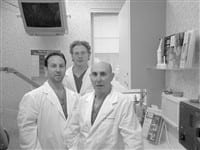State’s Hospitals Continue To Make Progress In Terrorism Preparedness Survey’s Findings Point To Work Completed Since 9/11 And Increased Need For Federal Assistance
BURLINGTON, Mass. — A survey on terrorism preparedness released recently by the Mass. Hospital Assoc. (MHA) found that hospitals in the state have made significant progress since 9/11 in upgrading facilities, systems, and disaster-readiness plans. Steps that hospitals have taken include identifying 1,200 adult beds that could be made available in the event of a mass disaster.
But while much work has been done, the survey also identified areas requiring ongoing attention, which hospital leaders say will necessitate assistance from the federal government in coordinating priorities and funding needed investment in technology and infrastructure. It also indicates that hospitals have purchased communications equipment, upgraded security, implemented training programs, and stockpiled antibiotics.
“Our survey shows that hospitals have stepped up in the wake of 9/11 and responded to the threat of terrorism and are committed to protecting the public health,” said MHA President Ron Hollander. “We should not interpret from this, however, that our work is done — because it is far from done. Massa-chusetts hospitals will continue to work closely with the state to address priority areas.
“This survey represents the first time that an inventory of hospital terrorism preparedness has been undertaken in the state,” he continued. “Hospitals have done a tremendous job of strengthening their disaster plans, but it is clear that direction and guidance from the federal government is needed about what, in fact, hospitals need to prepare for, as well as what equipment and training they will need to accomplish their preparedness goals — as well as assistance in purchasing that equipment.”
Key findings from the survey include:
• Hospitals have changed their antibiotic stocking policy since Sept. 11. Many hospitals are actively seeking federal guidance on how much should be stocked until federal stockpiles arrive.
• Ninety-eight percent of hospitals are implementing activities to educate health care providers and laboratory workers about biological/chemical em-ergency response procedures, although hospitals have identified a need for more training in areas such as radioactive and chemical agents, decontamination procedures, identification of agents, and detecting outbreaks.
• The vast majority of hospitals have procedures in place to provide adequate staffing for 24-hour operation in the event of a terrorist attack.
• Three-quarters of hospitals still see the need for additional personal protective equipment for their staff that might be required in a biochemical attack, a clear priority for additional federal funding and support.
The results of the survey will be used to aid hospitals in developing several priority areas for further attention and action to guide hospital planning activities, including:
• Testing and refinement of disaster plans through community, region, and state-wide drills;
• Increased coordination and planning with other hospitals and with state and community agencies;
• Development of benchmarks for personal protective equipment, decontamination facilities, isolation capacity, training, and pharmacy supplies and equipment;
• Development and coordination of plans to increase surge capacity to accommodate mass casualties;
• Development of recommendations to enhance both internal and external communication systems; and
• Development of hospital staff family preparedness plans.


